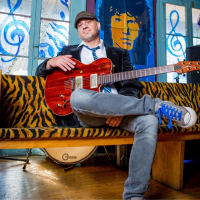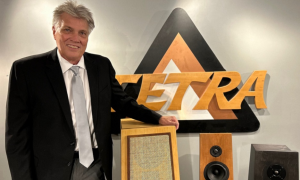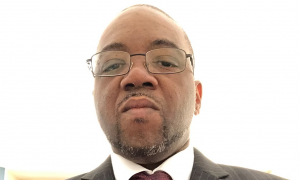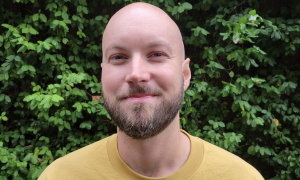Home » Jazz Articles » Chats with Cats » The Archival Producer: Zev Feldman
The Archival Producer: Zev Feldman

Courtesy Zak Shelby-Szyszko
About Zev Feldman
Zev Feldman is an internationally recognized, independent record producer and the Co-President of Resonance Records in Los Angeles. He is also a consulting producer of archival and historical recordings for Blue Note Records. Over the last 25 years he has worked for PolyGram, Universal Music Group, Rhino/Warner Music Group, Concord Music Group, among others. He won DownBeat Magazine's International Critics Poll for "Rising Star Producer" in 2016 for his work on a staggering 26 historical jazz recordings that year and was called "The Indiana Jones of jazz" by Stereophile Magazine. In addition to his lauded work at Resonance, where he works closely with the estates of jazz icons such as Bill Evans and Wes Montgomery, he's also involved with various other labels covering jazz, blues and rock including Elemental Music, Sunset Blvd Records, Real Gone Music, Reel To Real Recordings and others. Zev is one of the co-producers of 2017's highly acclaimed Thelonious Monk discovery, Les Liaisons Dangereuses on Sam and Saga Records, and another highly lauded Monk discovery Palo Alto from 2020 on Impulse! Records. Feldman is a native Washingtonian who grew up in the Washington D.C Area, and is currently in Los Angeles where he's resided for the last 15 years.All About Jazz: What does an archival producer do?
Zev Feldman: In this unusual job I have, I get to travel the world searching for previously unissued recordings—or never officially released recordings—by jazz greats. Over many years, my work has allowed me to develop relationships with people in France, Italy, Japan and elsewhere, people who are conduits to very special material, material that because of these relationships, I've been granted access to. Because I have a passion and I'm not easily deterred, I've found and identified hidden gems in archives and personal collections around the world that I've been fortunate to be able to bring to the public. Finding the music is only part of the story, though.
Almost as important as finding great music is putting together an informative presentation for each of the albums I produce. I work hard on the packages I conceive and create. I'm very proud of them. When listeners put one of my albums on their sound system, it's my goal that they will feel as if they're operating a time machine that takes them back to the live performances they're listening to and that they're sitting right in the front row. Taking in the essays and interviews, the photos and the ephemera we present in our album packages while our audience listens is a major part of the experience. I work with a dedicated team that includes a production manager, designer, music consultant, editor, writers and production assistants to assemble these elaborate packages.
As much work that goes into the productions themselves goes into the promotion of the projects. This means creating promotional videos, which we call mini-documentaries, and doing heavy promotion via social media channels and print advertising. I have to be creative and come up with ideas for best promoting and marketing these releases so that we reach people. The first half of my career was in sales and marketing, so I already bring that experience with me.
AAJ: How and where do you find these recordings?
ZF: Different places. It's often a real adventure. I've been doing this for a long time now and I've been fortunate to have had some great press along the way, so people often seek me out when they have—or know about—rare archival jazz recordings. Then, I have various means of vetting the material to verify that it's authentic and I analyze the music carefully to make sure that the performances are at a high level. I do this out of respect for the legacy of the artists and their families. This typically entails talking with musicians' families, researching discographies and archival tour schedules, receiving tips from scholars and collectors and keeping connected with archives around the world. I really love what I do and wake up every morning on a mission to find the next holy grail recording.
AAJ: Is it difficult to get the rights to some of these recordings?
ZF: Sometimes it is difficult. Every project has its own unique set of variables and challenges. Since I'm a firm believer that any project I work on has to be fully cleared with all pertinent rights holders before being released, sometimes that means it takes years for a project to come to fruition. Not only do you need the lead artist (or their heirs) to sign off, but you also need the permission of all the other musicians who played on the recording, plus the owner of the tape itself, as well as any and all other rights holders. All these pieces need to fall into place and fit within the budget we have available before we can start working on a project in earnest and set it up for release.
AAJ: Have you found that there's still great interest in these recordings?
ZF: Absolutely. In fact, I think we're in a golden era of sorts as it relates to archival jazz recordings. It's truly been amazing the kinds of enthusiastic responses I've gotten from people all over the world. Resonance's Bill Evans discovery from 2016, Some Other Time: The Lost Session from the Black Forest was a particularly groundbreaking achievement for us, as we sold over 60,000 copies worldwide. That might not seem like a lot when compared to pop artists, but it was a huge number for us in the jazz world and gave us the confidence to keep this mission going.
AAJ: What is your background and how did you become so knowledgeable about jazz?
ZF: A lot of people think of me as the "jazz guy," but I grew up listening to a lot of classical, world and folk music and especially classic rock, which was in many ways a bridge into jazz for me. Mostly I learned about music through self-exploration. I've been interested in jazz specifically since my teenage years. I remember seeing a performance of Miles Davis on TV when I was in high school. It might have been a Grammy broadcast. I had already been living in record stores by then, but that performance prompted me to move over to the Miles Davis section and I picked up a copy of Bitches Brew next time I went. I won't lie, it was way over my head for that time in my life. I think I was expecting something more swinging. I still played it a number of times, but when I got the album 'Round About Midnight with Miles, John Coltrane, Red Garland, Paul Chambers and Philly Joe Jones, it absolutely changed my life. I played it so many times; it's still a favorite album of mine to this day.
I also had the pleasure of meeting the producer, the late great George Avakian, later in life. Ironically, years later now I've grown to have a whole new appreciation for Bitches Brew. I have fond memories of taking the bus and train after school into Washington D.C. and going to record stores to buy my own records. I've spent a great deal of time researching music, studying liner notes and learning so much on my own from following the writing of journalists and reading record reviews. That all served as a compass for me. I devoted every ounce of energy I had in whatever personal time I had to listening to music or going to concerts or going to record stores and talking about music with everyone around me.
In college, where I majored in communications and radio broadcasting, I got an internship at PolyGram Records in Greenbelt, Maryland at their mid-Atlantic distribution office in January of 1994. In my record-business infancy as an intern at PolyGram, I assisted the sales, marketing and promotions team who represented labels such as Motown, Mercury, Island, A&M, Verve, Deutsche Grammophon and Def Jam. After a while, I was offered an actual job there; I was hired to work in the mailroom. After six months, I moved from the D.C. area to New York City to be PolyGram's classical and jazz field representative for Manhattan, followed in the next two years by working as a regional marketing representative covering the whole northeast region from Maine to Northern Virginia.
Eventually I left PolyGram and worked briefly at Rhino Records/Warner Music Group as the Northeast Regional Sales Manager before returning to my hometown to be a salesman for Universal Music Group and their family of labels. I did this for six-and-a-half years. Then I was recruited to work for Concord Music Group as a National Sales and Marketing Director for catalog recordings in Los Angeles. After that I began to work independently for various labels. I'm forever grateful to George Klabin of Resonance Records, where I've been since 2009. George first brought me in to do international sales and marketing, then I was made VP/General Manager and then, in 2018, co-president. George gave me my first opportunity to produce records. He told me that if I could find any previously unissued recordings that he might be interested in releasing, he would let me produce them for the label. That was like putting a match to gasoline. I haven't looked back since.
AAJ: You've partnered with some of the most storied jazz labels such as Blue Note and Impulse! unearthing forgotten recordings, what's it like to be given access to their vaults?
ZF: It's thrilling to be given access to this material. To clarify, I don't physically go into the vaults myself; usually a team onsite will pull the tapes, make copies and send me the music once it's been digitized. I've been working with Blue Note since January of 2019 as a consulting producer for archival recordings and it's personally been a dream come true for me. Having the opportunity to work for Blue Note is like being bumped up to the high court of jazz. I'm grateful to Don Was and Justin Seltzer for allowing me to contribute to their team. You still need to be very judicious in your decision making, differentiating between what's really good versus what's great, but there are a lot of famous records in there, with lots of leftovers hanging around for various reasons. You need to be able to weigh many different considerations and know the backstory and history of the artists and the label before taking steps toward a release.
At the end of the day, it's about protecting artists' legacies. It's crucial that we're careful in the decisions we make. Blue Note is one of my favorite labels of all time, so having the opportunity to suggest projects based on my knowledge of the artists and knowing about the various recordings that are in the vaults is a real thrill. There's a major production I'm working on right now that came about first and foremost as a result of me being a huge fan and geek about this particular album and having inside information about the tapes. It's more than just a job, I have a great deal of personal interest. It's a pleasure trying to find projects we can put out, utilizing the great resources of such a legendary catalog of incredible music recorded for the label. It's like being a kid in a candy store to some extent, but you can't eat everything! It's not easy accessing tapes now during the pandemic, but there's still exciting stuff happening and I'm looking forward to being able to share more about future projects soon.
AAJ: What are you currently working on?
ZF: Right now, I'm getting ready to release four different projects in partnership with Record Store Day for their Black Friday event on November 27th. On Resonance, there's Bill Evans Live at Ronnie Scott's from July of 1968 with Eddie Gomez and Jack DeJohnette. These are recordings from DeJohnette's personal archives. I was privileged to have been able to make several trips to Jack's home in upstate New York over the last couple of years to help prepare for this to come out. Another titillating aspect of this release for me is that we've licensed a never-before-published lithograph drawing by the legendary artist and illustrator David Stone Martin for the album cover. Martin is one of my personal heroes and inspirations and I'm really honored and excited to be able to feature his work on one of my projects.
I'm also thrilled to have our first partnership with another hero of mine, the tenor saxophone legend, Sonny Rollins. Rollins in Holland: The 1967 Studio & Live Recordings feature Sonny in three different performances in the Netherlands in May of 1967 with bassist Ruud Jacobs and drummer Han Bennink. We're presenting some exceptional previously unknown Sonny Rollins recordings in an official partnership with the Nederlands Jazz Archief, where my co-producer Frank Jochemsen discovered previously unissued tapes of Sonny from VARA Studio 5 in Hilversum and the Go-Go Club in Loosdrecht. The album also contains another wonderful live recording of Sonny, Ruud and Han recorded in Arnhem that same week. I was able to conduct an extensive phone interview with Sonny that we're including in the 100-page booklet and there's also a major essay by Aidan Levy, the author of the forthcoming authoritative biography of Sonny. This is a very gratifying project because Sonny was so enthusiastic about the recordings when he listened back to them. This was a little unexpected because historically, he's been known not to like listening to recordings of himself. But this time, he was taken with the freedom and joyful abandon of each member of the trio and how they played together and he's thrilled that it's coming out. It's a truly wonderful album.
The third upcoming Resonance release is a previously unissued recording by the great pianist Monty Alexander from 1982, Love You Madly: Live at Bubba's. My history with Monty goes way back to the mid-'90s when I was doing artist development work for his album, Yard Movement, on Island Jamaica Jazz. These are very high-quality recordings captured by the legendary engineer Mack Emmerman, who founded Criteria Recording Studios in Miami where many classic albums were recorded—albums by Eric Clapton, James Brown, Aretha Franklin, the Bee-Gees and many others.
Then, there's a fantastic previously unissued live recording from 1971 by the wonderful tenor player, George Coleman, for Reel To Real Recordings in Vancouver, Canada, which I'm co-producing with my dear friend Cory Weeds. This was material recorded at a concert presented by the Left Bank Jazz Society at the Famous Ballroom in Baltimore, Maryland featuring Danny Moore on trumpet, Albert Dailey on piano, Larry Ridley on bass and Harold White on drums. It's our second release from the Left Bank Jazz Society archives; the first one was Etta Jones, A Soulful Sunday with the Cedar Walton Trio, which came out in 2019.
Outside of these four Record Store Day Black Friday releases, I worked as a co-producer with the Thelonious Monk family on our second production, the widely acclaimed Impulse! Records release called Palo Alto, which was recorded at Palo Alto High School in California in 1968. This album came out in September. There are a couple of other Reel To Real projects in the works for 2021 from saxophonist Harold Land and drummer Roy Brooks. I'm also working on what will potentially be my largest project to date for Blue Note scheduled for 2021 that I'm really excited about, but can't divulge any details on just yet.
I'm even working on a couple of coffee table books of photography and art for the Jazz Images company in Barcelona, Spain featuring the photography of Don Schlitten and artwork of the legendary illustrator David Stone Martin.
AAJ: You've made your reputation searching through old recordings, how do you feel about the state of jazz music today?
ZF: I love the state of jazz today. There's really inspiring and adventurous music being made today, a lot of which is right in the pocket of my personal taste. Jazz has so many different types of styles and there's a wide array of folks I admire and enjoy, so I'm constantly coming across new things that I like. At the same time, I want to acknowledge that this is an especially trying time for artists. I have a lot of compassion for artists working hard to hang in there until things get back to normal. I've been extremely fortunate to have had opportunities to work on various projects at this time and I thank my lucky stars every day for that. Between working for Resonance and Blue Note, plus other freelance projects here and there, I'm keeping busy. But my heart goes out to all the artists out there not able to tour and play live.
AAJ: How have things been going since the pandemic?
ZF: It's definitely been a challenging time for the labels. The big Record Store Day event in April got postponed and they ended up stretching it out over three days in August, September and October. That was a major disruption for us at Resonance, but we've tried to make the best of it by pivoting to streaming playlists. Since everyone was stuck at home, we figured it was a great opportunity to get people to discover how much great music we've released. These range from historical recordings, as well as living artists' recordings from the last 10 years. We made "Best on Resonance" compilations with trumpeter Claudio Roditi, violinist Christian Howes, singer Polly Gibbons and pianist Donald Vega. We've also put together a ballads compilation called Quiet There and another one called Trip to Brazil.
On another front, we've just come out with a Bill Evans face mask, released in partnership with the Evans Estate, using a classic image by photographer Tom Copi. It took us around four months to get it from concept to reality since we've never sold merchandise before and we had to deal with a number of delays. The Bill Evans face mask is now available on our website and we hope it'll help give more visibility to our label and to Bill Evans. If everything goes well with this one, we'd like to do more with other artists in the future.
Luckily, we were still able to release a great Bob James recording from 1965 that was recorded by none other than Resonance founder George Klabin when he was a teen-aged student at Columbia University. George produced sessions featuring Bob at Wollman Auditorium, a beautiful concert hall on the Columbia campus, Judson Hall and elsewhere in New York City in the 1960s, including recordings by Keith Jarrett, Charles Lloyd, Bill Evans and the Thad Jones / Mel Lewis Orchestra. George also produced and released a beautiful new album by woodwinds master Eddie Daniels's Night Kisses: A Tribute to Ivan Lins, which features Bob James and Dave Grusin. This was a follow up to his Grammy nominated Heart of Brazil release from 2018, which was a tribute to the Brazilian composer/multi-instrumentalist Egberto Gismonti. It's part of a trilogy of recordings dedicated to Brazilian composers. The next one will be the music of Milton Nascimento.
AAJ: What have you been listening to lately?
ZF: Most recently, I've been really going deep with this Paul Desmond box set on Mosaic Records, The Complete 1975 Toronto Recordings. It's really exciting music, and I've especially dug listening to Ed Bickert on guitar. I've also been listening a lot to this box set on Third Man Records called the Ann Arbor Blues Festival 1969, which includes Howlin' Wolf, Muddy Waters, B.B. King and tons of other blues greats. These are both on top of my vinyl LP collection, which runs pretty deep.
AAJ: What have you been doing outside of work these days?
ZF: I make it a priority to have a healthy work-life balance and exercise has become a huge part of my life in recent years. I average about 10 miles walking every day. It breaks things up for me and lets me get away from my computer. When I first started working at Resonance, I would just sit at my desk for hours and hours every day, never moving around, and I put on a lot of weight. Again, I'm grateful to George Klabin, who showed concern for my unhealthy lifestyle and spurred me to get motivated and actually do something to start taking better care of myself, eating right and exercising. He rode me pretty hard and gave me the motivation I needed to make this change. George has been a really positive force in my life in this way and so many other ways. As much as I work hard, I also work out hard too. I'm single, so a lot of my life revolves around work and exercise. It's a great way to audition a lot of music, make calls, soak in some L.A. sunshine and stay active.
Tags
Chats with Cats
B.D. Lenz
United States
California
Los Angeles
Zev Feldman
Resonance Records
Bill Evans
Wes Montgomery
Thelonious Monk
George Klabin
Sonny Rollins
Monty Alexander
PREVIOUS / NEXT
Support All About Jazz
 All About Jazz has been a pillar of jazz since 1995, championing it as an art form and, more importantly, supporting the musicians who make it. Our enduring commitment has made "AAJ" one of the most culturally important websites of its kind, read by hundreds of thousands of fans, musicians and industry figures every month.
All About Jazz has been a pillar of jazz since 1995, championing it as an art form and, more importantly, supporting the musicians who make it. Our enduring commitment has made "AAJ" one of the most culturally important websites of its kind, read by hundreds of thousands of fans, musicians and industry figures every month.
























